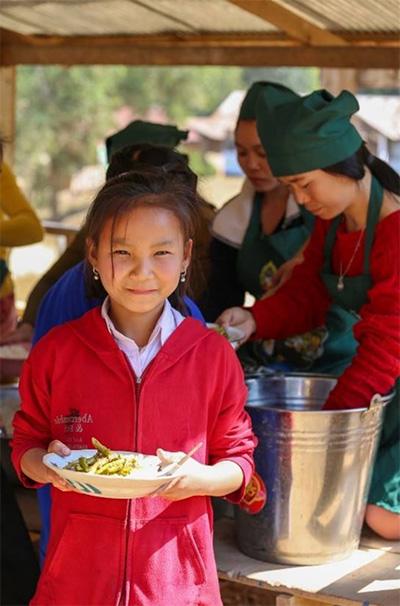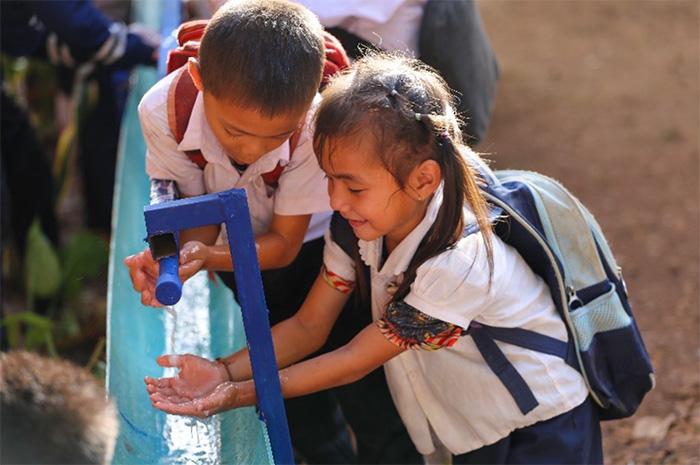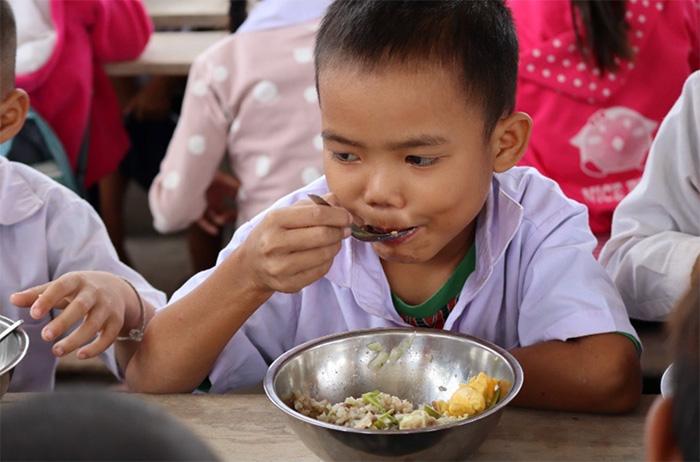
McGovern-Dole Success Story: Laos

In Laos, USDA provides funding to two organizations to implement McGovern-Dole projects: the United Nations World Food Program (WFP) and Catholic Relief Services (CRS). These two projects, both in partnership with Laos’s Ministry of Education and Sports, complement each other to maximize reach and effectiveness. The WFP FY 2020 project supports school meals for approximately 63,500 pre-primaryand primary level students across 705 schools in 11 provinces. The FY 2021 CRS project operates in 302 schools in Savannakhet province, providing school meals to 36,619 students. In addition, CRS plays a crucial role as an implementing partner to WFP in the FY 2020 project, providing assistance to schools supported in the province of Khammuane. This collaboration between WFP and CRS ensures comprehensive support and coordination in addressing food insecurity and promoting quality education in Laos.
The USDA projects in the country align with the Ministry of Education and Sports’ (MoES) Education Sector Development and Diversification Plan for 2021-2025. This plan identifies the need to reach disadvantaged students, including those residing in remote and rural areas, belonging to ethnicities other than Lao Thai, and speaking languages different from Lao. The USDA-funded projects target these marginalized students, aiming to improve their access to education and nutrition support. Furthermore, the USDA projects are designed to complement other significant education initiatives in the country that aim to improve learning outcomes. Among these initiatives are: USAID – Learn to Read, DFAT – BEQUAL, World Bank – GPE III, Republic of Korea’s Ministry of Agriculture, Food and Rural Affairs – Scaling Up Homegrown School Feeding Programme, German Federal Ministry for Economic Cooperation and Development – Accelerating School Meals Programs, and the European Union’s Education budget support program.

The previous FY 2017 award concluded in September 2023, resulting in the successful handover of the 1,423 schools under the FY 2017 project into the Lao Government’s National School Meals Program. Under the FY 2020 award, WFP and CRS continue to provide food for school meals in schools not previously assisted. The food support is complemented by WASH, literacy, school gardening, government capacity strengthening, communities’ capacity strengthening and other initiatives as part of a comprehensive program, which will lead to the eventual handover of the programs in the 705 WFP-supported schools to the government.
Since the start of the FY 2020 award, WFP has received over 3,500 metric tons of U.S. donated and regionally procured rice, oil, lentils, and canned fish, 1,633 metric tons of which was received in 2023. The commodities were distributed to the 705 schools to ensure that 63,500 students receive a nutritious school lunch each day. With this award, WFP supported the rehabilitation and construction of over 3,000 water sources, handwashing stations, kitchens, dining rooms, and food storage facilities, and provided trainings to nearly 500 teachers and administrators and over 2,900 school cooks. Additionally, WFP worked with MoES to distribute learning materials that were created in collaboration with the Ministry called the Green Box, which provided students in the supported schools with an array of interactive teaching and learning materials, covering topics such as nutrition, school gardening, and WASH though books, posters, games, cookbooks, and various other engaging teaching and learning materials.
A key component of the project is the focus on national-level assistance and capacity building. WFP has facilitated the formulation and issuance of multiple pieces of government legislation through USDA’s support, including, under the FY 2017 award, the School Feeding Handover Plan (2018) with MoES. More recently, through the McGovern-Dole FY 2020 support, the Lao government has shown continued commitment to reinforce the National School Meals Program legal framework with the endorsement of the Prime Minister’s Decree for School Lunch Promotion in August 2022, which integrated school feeding into the national budget. Additionally, guidelines on school meals implementation at the national, provincial, district, and community levels have been put in place. Despite the current severe economic challenges ongoing in Laos, the government has pledged to increase the daily allocation for school meals from 800 LAK per child/day to 1,000 LAK per child/day. It has simultaneously taken steps to streamline the disbursement of these funds. Lastly, to ensure continued monitoring after handover to the government, WFP has prioritized enhancing the Lao School Meals App, which allows monitors to efficiently collect school meals data both on- and offline.
CRS launched the third phase of the Learning and Engaging All in Primary School (LEAPS) project in
September 2021, building upon the successes of its predecessors. The project provides school meals to over 36,000 children across 302 schools located in Savannakhet province.

According to baseline assessments, literacy rates in target schools averaged 7 percent among Grade 2 students at the start of the project. LEAPS III focuses on enhancing these rates by supporting teachers, providing learning materials, and aligning instruction with the national curriculum set by the Ministry
of Education and Sports. The project also expanded early childhood education through the Community-Based School Readiness curriculum, which was introduced to 35 villages and helped prepare children for Grade 1 in 2022. A key objective of the project is improving access to water, sanitation, and hygiene facilities. By July 2023, LEAPS III had constructed 103 new latrines, increasing the proportion of schools meeting the national WASH standards. This progress supports the Lao Government’s goal of achieving open defecation-free status nationally by 2025.
Community mobilization and eventual handover of schools to government operation are also priorities. To prepare, LEAPS III is training over 1,642 community leaders, cooks and storekeepers in effective school meal management using a curriculum endorsed by MoES. CRS completed the Community Capacity Assessment to determine the readiness and capacity of the schools to be handed over to the government by looking at village susceptibility to shocks, school meals infrastructure, community contributions, and the functionality of the Village Education Development Councils. As of 2023, 103 schools from Atsaphone and Phalanxay districts transitioned successfully. By involving community members in the process, LEAPS III fosters a sense of ownership and sustainability. Moreover, LEAPS III supports the development of village education development committees through small grants, enabling them to support school development plans.
Research shows that providing daily school meals allows student to focus on schoolwork, helps increase enrollment and attendance, decreases drop-out rates, and improves students’ cognitive abilities. USDA’s support is key to ensuring that students have access to and continue to go to school in Laos.
